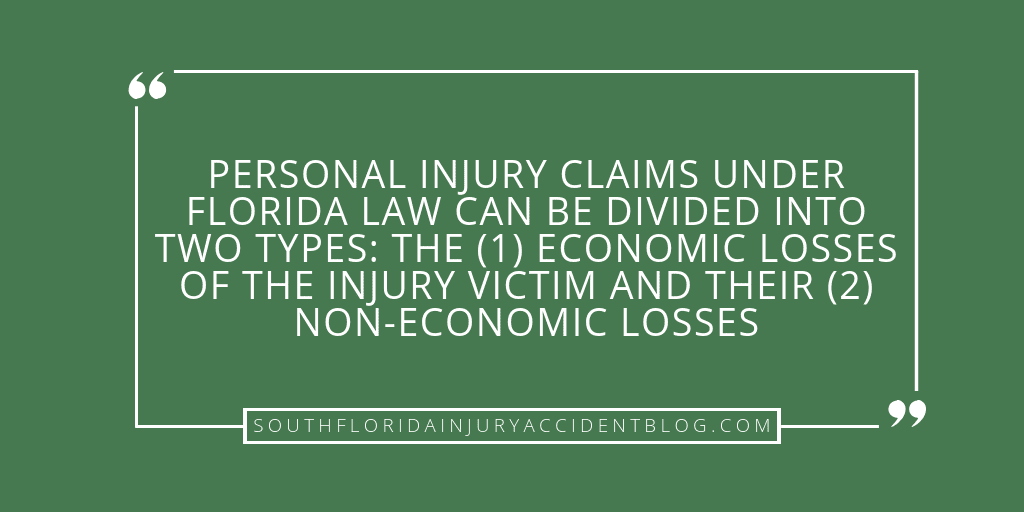The Two Categories of Damages That An Injury Victim May Recover Under Florida Personal Injury Law: Economic Damages and Non-Economic Damages
According to Florida law, whether or not you take your case to trial or if you settle your claim with the insurance company, there are certain kinds of losses for which you will be compensated and some losses for which you will not.
The wrongdoer (tortfeasor), no matter how negligent, is not responsible for compensating a victim for all of his or her damages.
From Campbell v. Government Employees Insurance Co., 306 So. 2d 525 (Fla. 1974):
Compensatory damages do not always fully compensate in grievous situations nor do they have a general salutary effect under prevailing conditions to promote fair treatment of the public. At best, litigation, even when successful is an inconvenience, often an ordeal. Compensatory damages do not sometimes offer reparation for mental invasion. Moreover, it is difficult to translate pain and suffering, disfiguration, loss of enjoyment of life, loss of prospects, into compensatory dollars.
What Type of Personal Injury Damages Are Allowed Under Florida Law?
Generally speaking, personal injury damages cannot be precisely determined. Jury’s use their discretion, as outlined by the judge in the jury instructions, to try and return the victim to the condition he or she was in before the accident. They do so by compensating victims for:
Economic Damages
Economic damages are those that can be documented by invoices, tax returns, pay stubs and similar documents. The most common economic damages recognized by Florida law, include:
- Hospital and medical bills
- Pain medication expenses
- Home nursing care bills
- Doctor bills
- EMS bills
- Therapy bills (current and future treatment)
- Rental of Medical Equipment
Under revised Florida Statute 768.81, (Florida’s Negligence Statute), economic damages are defined as:
“Economic damages” means past lost income and future lost income reduced to present value; medical and funeral expenses; lost support and services; replacement value of lost personal property; loss of appraised fair market value of real property; costs of construction repairs, including labor, overhead, and profit; and any other economic loss that would not have occurred but for the injury giving rise to the cause of action.
Non-Economic Damages
Non-economic are those damages that cannot be determined, or estimated, by looking at numbers on a piece of paper. These damages include things like:
- Loss of spousal and parental consortium
- Loss of the enjoyment of life
- Pain and suffering (physical pain)
- Scarring and Disfigurement
- Mental anguish or emotional distress
- Physical impairment
While it’s is not that easy to quantify pain that someone feels, and it’s true that some may be more pain tolerant than others, to determine damages for non-economic damages, a jury can also consider:
- the permanency of the injury
- age of the victim
- the injured party’s life expectancy
- the victim’s mental and physical health before the injuries
- the victim’s past earning capacity
- the degree of the negligent act
- the effect of the injury on the victim’s health and the expected recovery time predicted by the physicians and therapists
- the extent to which and injury diminishes the person’s capacity to earn a living
- the victim’s inconvenience in the future
- the value of a dollar in today’s dollars (time value of money)
See: Settlement Values Of Personal Injury Cases

Losses Not Covered by Florida Personal Injury Law
Not every harm is covered. One example of damages that are not covered in Florida: the emotional distress felt by someone who sees an accident or experiences a traumatic event unless your psychological trauma has manifested into a physical illness. As explained by the Florida Supreme Court in Champion v. Gray, 478 So.2d 17 (Fla. 1985):
The complaint in the case alleges that Mrs. Champion heard the accident, came immediately to the accident scene, and suffered severe emotional distress and shock which led to her death shortly after seeing her injured child. The requirements set out in this opinion have been met. No physical impact to her need be alleged because she suffered discernible physical injuries (death).
Accordingly, we answer the certified question, as limited, in the affirmative. We hold that a claim exists for damages flowing from a significant discernible physical injury when such injury is caused by psychic trauma resulting from negligent injury imposed on another who, because of his relationship to the injured party and his involvement in the event causing that injury, is foreseeably injured.
Read: Florida Car Accident Compensation Law
What Should You Do?
A good piece of advice if you have been harmed due to negligence, is to speak with an experienced personal injury lawyer to learn about some of the issues that can arise with these claims, including the type of evidence needed to prove a claim and how a jury will respond to certain types of damage claims. Most personal injury lawyers, like Alan Sackrin, will offer a free initial consultation (over the phone or in-person) to answer your questions.
Related:
- How Can I Get Maximum Compensation for My Injury Case?
- How Do Florida Juries Decide Damage Awards When The Victim Has A “Pre-Existing Condition?”
- Jury Instructions For Calculating Damages in Personal Injury Cases
___________________
 Do you have questions or comments? Then please feel free to send Alan an email or call him now at (954) 458-8655.
Do you have questions or comments? Then please feel free to send Alan an email or call him now at (954) 458-8655.
If you found this information helpful, please share this article and bookmark it for your future reference.
